Tomorrow You're Gone Blu-ray Movie
HomeTomorrow You're Gone Blu-ray Movie 
Boot TracksImage Entertainment | 2012 | 92 min | Rated R | May 14, 2013
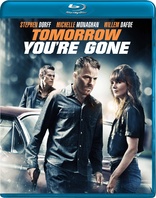
Movie rating
5.3 | / 10 |
Blu-ray rating
| Users | 0.0 | |
| Reviewer | 2.0 | |
| Overall | 2.0 |
Overview
Tomorrow You're Gone (2012)
Charlie Rankin is out of prison but not out of danger. Indebted to the man who saved his life behind bars, Charlie must now carry out a murder to settle the score.Unexpectedly he meets Florence, a mysterious and beautiful lost soul who sees the good within Charlie's dark shell. When the hit goes bad, Charlie soon finds himself in over his head and must figure out how to settle his debts, discover his own identity, embrace a romance with Florence, and find the road to redemption.
Starring: Stephen Dorff, Michelle Monaghan, Willem Dafoe, Robert LaSardo, Tara BuckDirector: David Jacobson
| Thriller | Uncertain |
| Action | Uncertain |
Specifications
Video
Video codec: MPEG-4 AVC
Video resolution: 1080p
Aspect ratio: 2.36:1
Original aspect ratio: 2.39:1
Audio
English: DTS-HD Master Audio 5.1 (48kHz, 24-bit)
Subtitles
English SDH, Spanish
Discs
25GB Blu-ray Disc
Single disc (1 BD)
Packaging
Slipcover in original pressing
Playback
Region A (B, C untested)
Review
Rating summary
| Movie | 1.5 | |
| Video | 4.5 | |
| Audio | 4.0 | |
| Extras | 0.0 | |
| Overall | 2.0 |
Tomorrow You're Gone Blu-ray Movie Review
Was He Ever Here?
Reviewed by Michael Reuben May 13, 2013Tomorrow You're Gone (hereafter "TYG") is a classic example of a film that tries to sustain itself on atmosphere alone and fails miserably. Because director David Jacobson and screenwriter Matthew F. Jones are primarily interested in a dank sense of grim foreboding, they never bother to tell any kind of story, even a fractured and crazy one, as David Lynch might do. They just keep piling one vague hint on top of another, and early on you suspect (rightly so) that most of the murky events will never be adequately explained. A storyteller like Lynch leaves you with questions, but he also gives you spellbinding sequences that have internal coherence and hold your attention while they last (ask any fan of Mulholland Drive for their three favorite scenes). Jacobson and Jones always seems to be on the verge of an interesting sequence, just before they cut away to something else. Jacobson's last film was the disturbing Down in the Valley (2005), in which Edward Norton played a contemporary "urban cowboy" romancing a teenager from the San Fernando Valley half his age (played by Evan Rachel Wood) over the strenuous objections of her father. What started as an apparently harmless flirtation eventually turned dangerous, and Jacobson handled the modulation of tone effectively. But there he was telling a story objectively, set against a recognizable landscape with clear points of reference. In TYG, Jacobson tells the story from the subjective point of view of his protagonist, a recently released ex-con, who's withdrawn and uncommunicativeónone of which makes the narrative easy to follow. Then, by suggesting early on that the ex-con has trouble distinguishing between illusion and reality, Jacobson really paints himself into a corner. It's all well and good to have an unreliable narrator, but first you need to establish some basic exposition and get your story underway.
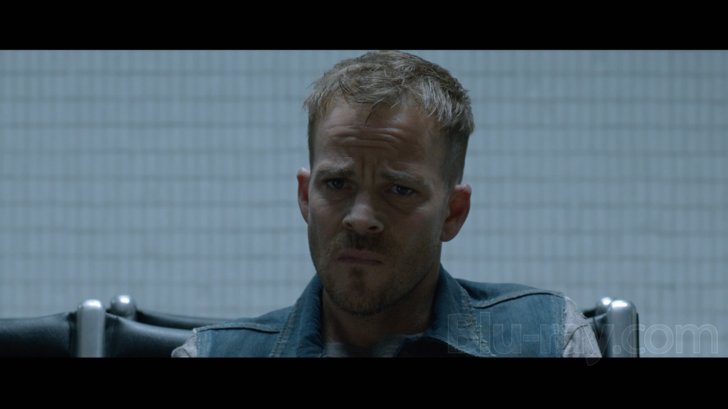
Charlie Rankin (Stephen Dorff) is nearing the end of a four-year prison sentence, when he receives a letter from his boss and mentor, known as "the Buddha" (Willem Dafoe). Concealed within the letter is a coded message instructing Charlie to kill a man when he is released. Having completed his jail term, Charlie visits a seedy bar called Moe's where the mere mention of the Buddha's name is enough to persuade the bartender, Ornay Corale (Robert LaSardo), to give Charlie a room next door. There Charlie waits, confused and tormented by jagged fragments of unpleasant memories, until the Buddha appears and tosses him the key to a bus station locker. The locker contains a gym bag with cash and a gun for the "hit", but Charlie has become so suspicious of surveillance that he has a homeless man retrieve bag for him. By this point, the viewer can't tell whether Charlie is prudently cautious or delusionally paranoid. On his way to the job at hand, Charlie is sidetracked by what appears to be a chance encounter. He's picked up on the bus by a pretty young woman named Florence Jane (Michelle Monaghan), who remains a cipher. Some viewers think she's a hooker, because she's a part-time porn actress and is eager to show Charlie one of her performances on tape, all the while declaring that the real her isn't the girl on the screen. But if Florence is a pro, she's a spectacularly inept one who doesn't set a price, gets no money up front and wastes a lot of time on an unlikely prospect. There are hints in the film that Florence may not have met Charlie by chance, but if so who sent her and for what purpose? As with just about everything in TYG, the filmmakers provide no explanation. The PR machine responsible for advertising copy describes Florence as a "lost soul" who can see the "good hidden beneath" Charlie's "tough exterior"; if so, she's so lost that she picks up a stranger on a bus and takes him home without any thought to the risk she's incurring. It says a lot about the flaws of TYG that Monaghan, an actress known for her ability to play down-to-earth and girl-next-door, cannot make Florence cohere on the screen for even a moment. She remains a plot function, not a character. Worse, it's never clear what her "function" really is. When Charlie reaches his target, complications arise because of an unexpected presence. Charlie handles the situation poorly (from a hitman's point of view), and the Buddha orders him to correct his mistake. Charlie's efforts to do so round out the film, which doesn't so much conclude as simply end, because there are no more scenes to show. Suggestions abound throughout the film of serious trauma, both psychological and physical, in Charlie's childhood, but their relation to present events is never explained. Is Charlie suffering from delusions? Multiple personality disorder? PTSD? Are events in the past directly connected to those unfolding in the present? You certainly don't get any clues from Dorff's one-note performance. He spends the entire movie looking pained, and very quickly you know just how he feels.
Tomorrow You're Gone Blu-ray Movie, Video Quality 
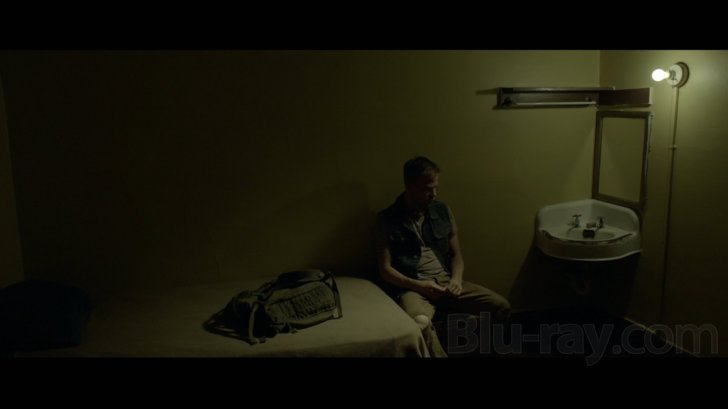
Whatever the shortcomings of Tomorrow You're Gone as a film, the image on Image Entertainment's 1080p, AVC-encoded Blu-ray provides little to find fault with. Photographed digitally with the Arri Alexa by Michael Fimognari (Beautiful Boy ), the image is clean, detailed and sharp but with the film-like texture for which the Alexa is justly renowned. Blacks are deep and solid, which is critical, because so much of the film is set in dim settings and darkened rooms. Colors tend to be muted and dull, because the world of TYG is not especially vital or alive, but Charlie does buy Florence a red sports car that contrasts nicely with the otherwise grim surroundings. (It's probably not an accident that red is also the color of blood.) Various visual distortions occur throughout the film, but these are intentional and designed to raise questions about the state of Charlie Rankin's mental health and his capacity to perceive the world accurately. The 92-minute film is contained on a BD-25 with a single soundtrack option and no real extras; at an average bitrate of just under 25 Mbps, compression issues were not in evidence.
Tomorrow You're Gone Blu-ray Movie, Audio Quality 
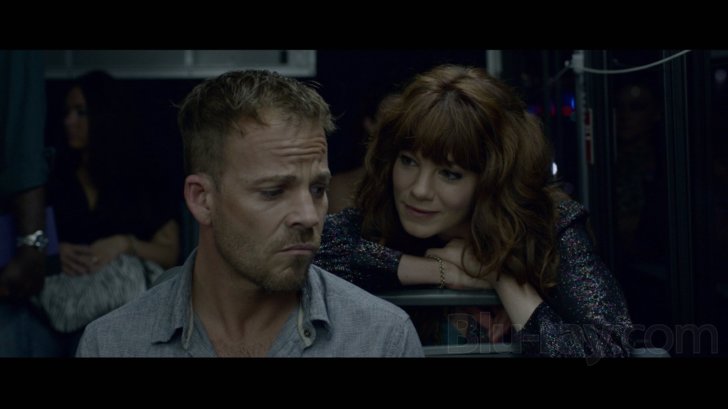
The dynamic range and bass extension in the Blu-ray's lossless DTS-HD MA 5.1 track become evident early on when Charlie first approaches Moe's Bar and Grille where the Buddha's name will get him a room. The distant throbbing from the bar's pounding sound system will put your system's subwoofer to work. The best surround showcases, however, are the subjective moments that reflect Charlie's state of mind, when present events merge with memories in an aural cocktail that swirls around Charlie, often leaving him dazed. The mix uses the full surround array to achieve this effect. The portentous score is by Peter Salett, who also composed the music for director Jacobon's Down in the Valley and has contributed songs to such films as Forgetting Sarah Marshall. It sounds fine for what it is.
Tomorrow You're Gone Blu-ray Movie, Special Features and Extras 
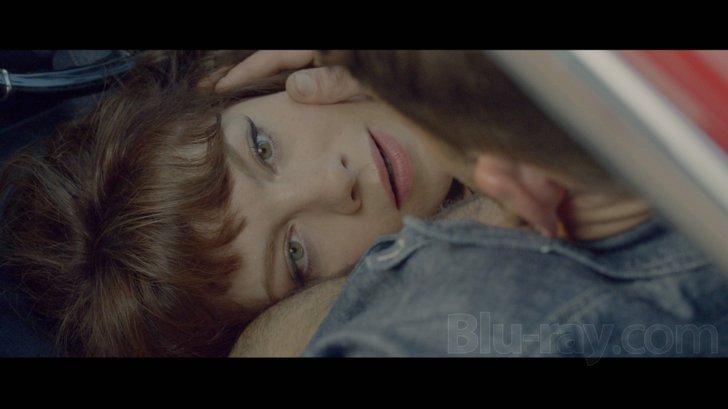
Other than introductory trailers (in 1080p) for The Numbers Station and Day of the Falcon, the disc contains no extras. These trailers play at startup and can be skipped with the chapter forward button, but cannot be played once the disc loads.
Tomorrow You're Gone Blu-ray Movie, Overall Score and Recommendation 
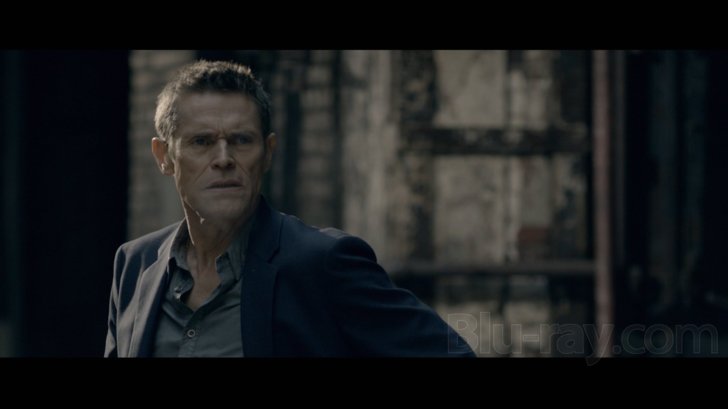
I was a fan of Down in the Valley, but I can't recommend Jacobson's long-delayed follow-up, despite the Blu-ray's technical superiority. The story is too unfocused, the performances too detached, and the whole effort provides too little reward for the investment of your time in watching. Not recommended.
Similar titles
Similar titles you might also like

The Recruit
2003

First Blood 4K
Rambo
1982

The Runner
2015

Rambo III 4K
1988

Oldboy
2013

24 Hours to Live
2017

Detective Knight: Redemption
2022

Killer Elite
2011

Stone
2010

Chain Reaction
1996

Eraser
1996

The Rock
1996

The Assault
L'assaut
2010

The Hard Corps
2006

Vehicle 19
2013

Drop Zone 4K
Standard Edition
1994

The Hit List
2011

American Violence
2017

Hijacked
2012

Spy Game
2001